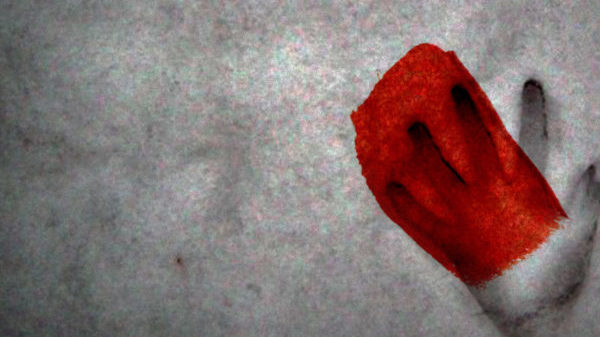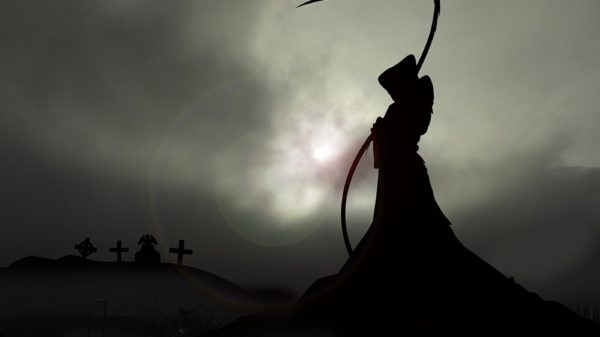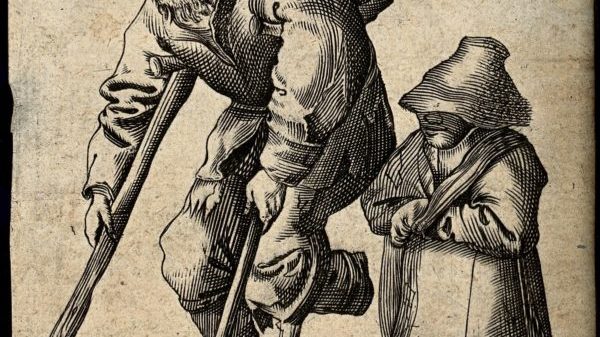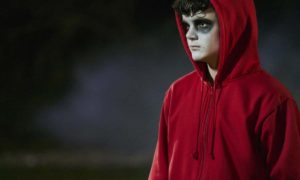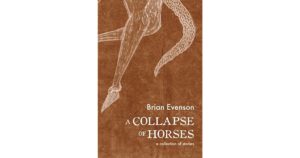The woman is a mound of dirt and rags pushing a squeaky shopping cart; a lump that moves steadily, slowly forward, as if dragged by an invisible tide. Her long, greasy hair hides her face but Ramon feels her staring at him.
He looks ahead. The best thing to do with the homeless mob littering Vancouver is to ignore it. Give them a buck and the beggars cling to you like barnacles.
“Have you seen my children?” the woman asks.
Her voice, sandpaper against his ears, makes him shiver. His heart jolts as though someone has pricked it with a needle. He keeps on walking, but much faster now. It isn’t until he is shoving the milk inside the fridge that he realizes why the woman’s words have upset him: she reminds him of the Llorona.
He hasn’t thought about her in years, not since he was a child living in Potrero.
Everyone in town had a story about the Llorona. The most common tale was that she drowned her children in the river and afterwards roamed the town, searching for them at night; her pitiful cries are a warning and an omen.
Camilo, Ramon’s great-uncle, swore on his mother’s grave that he met this ghost while riding home one night. It was the rainy season, when the rivers overflow and Camilo was forced to take a secondary, unfamiliar road.
He spotted a woman in white bending over some nopales at the side of a lonely path. Her face was covered with the spines of the prickly pears she had savagely bitten. She turned around and smiled. Blood dripped from her open mouth and stained her white shift.
This was the kind of story the locals whispered around Potrero. It was utter nonsense, especially coming from the lips of a chronic alcoholic like Camilo, but it was explosive stuff for an eight-year old boy who stayed up late to watch black-and-white horror flicks on the battered TV set.
However, to think about the Llorona there in the middle of the city between the SkyTrain tracks and a pawn shop is ridiculous. Ramon never packed ghost stories in his suitcase, and Potrero and the Llorona are very far away.
He sees the homeless woman sitting beneath a narrow ledge, shielding herself from the rain. She weeps and hugs a plastic bag as though it were a newborn.
“Have you seen my children?” she asks when he rushes by, clutching his umbrella.
Nearby a man sleeps in front of an abandoned store, an ugly old dog curled next to him. The downtown homeless peek at Ramon from the shadows as he steps over old cigarette butts.
They say this is an up and coming neighborhood but each day he spots a new beggar wielding an empty paper cup at his face.
It is disgraceful.
This is the very reason why he left Mexico. He escaped the stinking misery of his childhood and the tiny bedroom with the black-and-white TV set he had to share with his cousins.
Behind his house there were prickly pears and emptiness. No roads, and no buildings. Just a barren nothing swallowed by the purple horizon. It was easy to believe that the Llorona roamed there.
But not in Vancouver which is new and shiny, foaming with lattes and tiny condos.
The dogs are howling. They scare him. Wild, stray animals that roam the back of the house at nights. His uncle told him the dogs howled when they saw the Llorona. Ramon runs to the girls’ room and sneaks into his mother’s bed, terrified of the noise and his mother has to hold him in her arms until he falls asleep.
But when he wakes up Ramon is in his apartment and it is only one dog, the neighbor’s Doberman, barking.
He rolls to the centre of the bed, staring at the ceiling.
Ramon spots the woman a week later, her arms wrapped around her knees.
“My children,” she asks, with her cloud of dirty hair obscuring her face. “Where are my children?”
Nauseating in her madness, a disgusting sight growing like a canker sore and invading his streets. Just like the other homeless littering the area: the man in front of the drugstore that always asks him for spare change even though Ramon never gives him any, or the gnarled man beneath a familiar blanket, eternally sleeping in the shade of the burger joint.
The city is heading to the gutter. Sure, it looks pretty from afar with its tall glass buildings and its mountains, but below there is a depressing stew of junkies and panhandlers that mars the view. It reminds him of Potrero and the bedroom with the leaky ceiling. He stared at that small yellow leak which grew to become an obscene, dark patch above his bed until one day he grabbed his things and headed north.
He felt like repeating his youthful impulsiveness, gathering his belongings in a duffel bag and leaving the grey skies of Vancouver. But he had the condo which would fetch a killing one day if he was patient, his job, and all the other anchors that a man pushing forty can accumulate. A few years before, maybe. Now it seemed like a colossal waste of time.
Ramon tries to comfort himself with the thought that one day when he retires he will move to a tropical island of pristine white beaches and blue-green seas where the wrecks of humanity can never wash ashore.
He’s gone to buy groceries and there she is, picking cans out of the garbage in the alley behind the supermarket.
Llorona.
He used to send a postcard to his mother every year when he was younger, newly arrived in the States. He couldn’t send any money because dishwashing didn’t leave you with many spare dollars and he couldn’t phone often because he rented a room in a house and there was no phone jack in there. If he wanted to make a call he had to use the pay phone across the street.
Instead, he sent postcards.
Carmen didn’t like it.
His sister complained about his lack of financial support for their mother.
“Why do I have to take care of mom, hu? Why is it me stuck in the house with her?” she asked him.
“Don’t be melodramatic. You like living with mom.”
“You’re off in California and never send a God damn cent.”
“It ain’t easy.”
“It ain’t easy here either, Ramon. You’re just like all the other shitty men. Just taking off and leaving the land and the women behind. Who’s gonna take care of mom when she gets old and sick? Whose gonna clean the house and dust it then? With what fucking money? I ain’t doing it, Ramon.”
“Bye, Carmen.”
“There’s some things you can’t get rid of, Ramon,” his sister yelled.
He didn’t call after that. Soon he was heading to another city and by the time he reached Canada he didn’t bother sending postcards. He figured he would, one day, but things got in the way and years later he thought it would be even worse if he tried to phone.
And what would they talk about now? It had been ages since he’d left home and the sister and cousins that had lived in Potrero. He’d gotten rid of layers and layers of the old Ramon, moulting into a new man.
But maybe Carmen had been right. Maybe there’s some things you can’t get rid of. Certain memories, certain stories, certain fears that cling to the skin like old scars.
These things follow you.
Maybe ghosts can follow you, too.
It’s a bad afternoon. Assholes at work and in the streets. And then a heavy, disgusting rain pours down, almost a sludge that swallows the sidewalks. He’s lost his umbrella and walks with his hands jammed inside his jacket’s pockets, head down.
Four more blocks and he’ll be home.
That’s when Ramon hears the squeal. A high-pitched noise. It’s a shriek, a moan, a sound he’s never heard before.
What the hell is that?
He turns and looks and it is the old woman, the one he’s nicknamed Llorona, pushing her shopping cart.
Squeak, squeak, goes the cart, matching each of his steps. Squeak, squeak. A metallic chirping echoed by a low mumble.
“Children, children, children.”
Squeak, squeak, squeak. A metallic chant with an old rhythm.
He walks faster. The cart matches his pace; wheels roll.
He doubles his efforts, hurrying to cross the street before the light changes. The cart groans, closer than before, nipping at his heels.
He thinks she is about to hit him with the damn thing and then all of a sudden the sound stops.
He looks over his shoulder. The old woman is gone. She has veered into an alley, vanishing behind a large dumpster.
Ramon runs home.
The dogs are howling again. A howl that is a wail. The wind roars like a demon. The rain scratches the windows, begging to be let in, and he lies under the covers, terrified.
He feels his mother’s arm around his body, her hands smoothing his hair like she did when he was scared. Just a little boy terrified of the phantoms that wander through the plains.
His mother’s hand pats his own.
Mother’s hand is bony. Gnarled, long fingers with filthy nails. Nails caked with dirt. The smells of mud, putrid garbage, and mold hit him hard.
He looks at his mother and her hair is a tangle of grey. Her yellow smile paints the dark.
He leaps from the bed. When he hits the floor he realizes the room is filled with at least three inches of water.
“Have you seen my children?” the thing in the bed asks.
The dogs howl and he wakes up, his face buried in the pillow.
He takes a cab to work. He feels safer that way. The streets are her domain, she owns the alleys.
When he goes to lunch he looks at the puddles and thinks about babies drowned in the water; corpses floating down a silver river.
Don’t ever let the Llorona look at you, his uncle said. Once she’s seen you she’ll follow you home and haunt you to death, little boy.
“Oh, my children,” she’ll scream and drag you into the river.
But he’d left her behind in Potrero.
He thought he’d left her behind.
Ramon tries to recall if there is a charm or remedy against the evil spirit. His uncle never mentioned one. The only cure he knew was his mother’s embrace.
“There, there little one,” she said, and he nested safe against her while the river overflowed and lightning traced snakes in the sky.
• • • •
In the morning there is a patch of sunlight. Ramon dares to walk a few blocks. But even without the rain the city feels washed out. Its colour has been drained. It resembles the monochromatic images they broadcasted on the cheap television set of his youth.
Even though he does not bump into her, the Llorona’s presence lays thick over the streets, pieces of darkness clinging to the walls and the dumpsters in the alleys. It even seems to spread over the people: the glassy eyes of a binner reflect a river instead of the bricks of a building.
He hurries back home and locks the door. But when it rains again, water leaks into the living room. Just a few little drops drifting into his apartment.
He wipes the floor clean. More water seeps in like a festering boil, cut open and oozing disease.
The Llorona stands guard in the alley. She is a lump in the night looking up at his apartment window. He feels her through the concrete walls and the glass. Looking for him.
He fishes for the old notebook with the smudged and forgotten number.
The rain splashes against his building and the wind cries like a woman.
The dial tone is loud against his ear.
More than ten years have passed. He has no idea what he’ll say. He doesn’t even understand what he wants to ask. He can’t politely request to ship the ghost back to Mexico.
He dials.
The number has been disconnected.
He thinks about Carmen and his mother and the dusty nothingness behind their house.
There might not even be a house. Perhaps the night and the river swallowed them.
The Llorona comes with the rain. Or maybe it is the other way around: the rain comes with her. Something else also comes. Darkness. His apartment grows dimmer. He remains in the pools of light, away from the blackness.
Outside, in the alley, the Llorona scratches the dumpster with her nails.
The dogs howl.
Ramon shivers in his bed and thinks about his mother and how she used to drive the ghosts away.
She is sitting next to a heap of garbage in the middle of the alley, water pouring down her shoulders. She clutches rags and dirt and pieces of plastic against her chest, her head bowed and her face hidden behind the screen of her hair.
“My children. My children.”
She looks up at him, slowly. The rain coats her face, tracing dirty rivulets along her cheeks.
He expects an image out of a nightmare: blood dripping, yellow cat-eyes or a worn skull. But this is an old woman. Her skin has been torn by time and her eyes are cloudy. This is an old woman.
She could be his mother. She might be, for all he knows. He lost her photograph a long time ago and can’t recall what she looks like anymore. His mother who ran her fingers through his hair and hugged him until the ghosts vanished. Now he’s too old for ghosts, but the ghosts still come at nights.
The woman looks at him. Parched, forgotten, and afraid.
“I’ve lost my children,” she whispers with her voice of dead leaves.
The alley is a river. He goes to her, sinks into the muck, sinks into the silvery water. He embraces her and she strokes his hair. The sky above is black and white, like the pictures in the old TV set and the wind that howls in his ears is the demon wind of his childhood.


